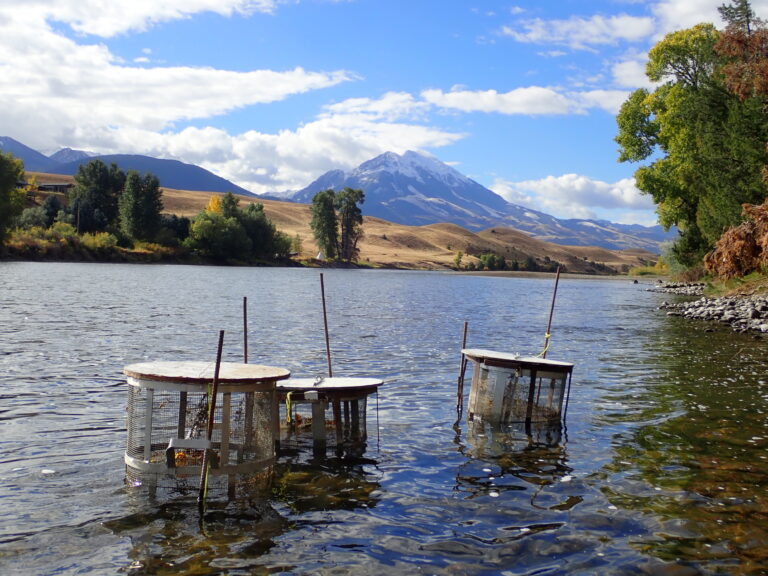Project Description
Climate change is projected to cause elevated water temperatures with far-reaching effects on nutrient cycling, population ecology and shifts in species distributions. A crucial consequence of increasing water temperatures is the potential for severe disease outbreaks among aquatic animal populations. Aquatic pathogens are likely to exhibit strong shifts in phenological, behavioural and life-history phenotypes in response to environmental change. However, the effects of enhanced transmission and virulence on host ecology, adaptation and evolution are poorly understood.
Proliferative kidney disease (PKD), a devastating disease of salmonid fish in the UK, Europe, and USA, is caused by the myxozoan parasite, Tetracapsuloides bryosalmonae. In the USA, major outbreaks have also occurred in non-salmonids with mass die-off events being recorded in whitefish populations. T. bryosalmonae is also widespread in UK wild salmonid populations and may become a more serious issue in the future as climate change processes continue to evolve.
A major barrier in tackling PKD is the lack of understanding of parasite virulence and links with climate-driven processes such as increased water temperatures. Intrinsically Disordered Proteins (IDPs) are virulence factors important in infectious disease, including COVID-19. Microexon genes (MEGs) encode IDPs thought to be unique to helminth parasites. The Aberdeen team have uncovered a novel T. bryosalmonae (Tb)MEG that acts as an important virulence factor. TbMEG-1 exhibits extensive sequence diversity in fish, which is likely to be linked to distinct parasite strains and virulence levels. However, the population-level diversity and concomitant capacity for immunogenomic adaptation in fish hosts is poorly understood.
This project aims to investigate relationships between environmental factors, pathogen virulence and adaptive diversity with a focus on TbMEG-1 and other parasite IDPs implicated in immune evasion within fish hosts. The project will focus on rainbow trout and whitefish populations in Yellowstone and Columbia River systems in the USA, where PKD as emerged as a disease of heightened economic and ecological importance.
Key questions are:
- What are the levels of TbMEG-1 / IDP diversity in natural and farmed fish populations?
- Are patterns of immunodiversity linked to parasite strains and/or virulence?
- Are these links affected by environmental factors such as temperature change?
The successful student will:
- Use bioinformatics to shortlist secretory IDPs from the bryosalmonae genome.
- Undertake targeted RNA-Seq to determine IDP profiles linked to distinct parasite strains and virulence levels.
- Determine how these links are affected by ecological and environmental factors.
- Further develop serologic diagnostics to aid disease risk management.
The student will undertake a 15-week lab and fieldwork study visit to the Yellowstone and Columbia rivers in 2022, where training will be provided in sample and data collection, including molecular and histological diagnostics, parasite genotyping, eDNA monitoring, electrofishing, and mark-recapture experiments. Aberdeen training will involve molecular techniques, including q-PCR, histology, and indirect ELISA, as well as advanced bioinformatics and multivariate statistics. Other training opportunities will be available via Quadrat in communication, written, and presentational skills at project meetings and conferences.
CANDIDATE BACKGROUND
Applicants should hold at least a 2:1 honours degree in biological sciences, such as environmental sciences, ecology, and molecular biology. Applicants with a first-class degree and/or a master’s qualification are particularly encouraged to apply.
Experience in the following is desirable:
- Molecular biological techniques.
- Statistical analysis using R or equivalent.
- Field work studies
- Bioinformatics, including Linux OS and RNA-Seq analysis pipelines.
Photo credit: Jason Holland
Supervisors
Jason HollandPrimary Supervisor: | Profile: Jason Holland Email: j.holland@abdn.ac.uk Institution: University of Aberdeen Department/School: School of Biological Sciences |
Caroline MehargSecondary Supervisor: | Profile: Caroline Meharg Email: caroline.meharg@qub.ac.uk Institution: Queen's University, Belfast Department/School: School of Biological Sciences |
Marius WenzelAdditional Supervisor: | Profile: Marius Wenzel Email: marius.wenzel@abdn.ac.uk Institution: University of Aberdeen Department/School: School of Biological Sciences |
References
Faber et al. (2021) Scientific Reports, 11, 2149.
Bartošová-Sojková et al. (2021) Biology, 10, no.2, 110.
Abos et al. (2018). Frontiers Immunol, 9, Article 1203
QUADRAT Themes
- biodiversity
- environmental-management
Partners
To be confirmed






















































